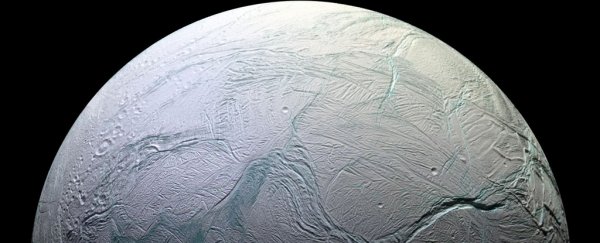While there's no shortage of exoplanets being discovered these days, finding signs of alien life could be a heck of a lot easier if we stuck to our own Solar System – which is why a group of scientists in the US want to launch a new mission to explore Saturn's icy moon Enceladus.
Despite the inhospitable appearance of Enceladus's frosty surface, scientists think there's a good chance that life could exist in the vast global ocean buried under the moon's icy exterior.
So planetary scientist Carolyn Porco – leader of the imaging team on NASA's Cassini mission currently orbiting Saturn – is helming a new research effort to send another spacecraft to the planet's moon, and this time to specifically look for signs of alien life.
Convening a group of astrobiologists, oceanographers, and organic chemists at the University of California, Berkeley last month, Porco and her fellow researchers are trying to figure out just how a search for extraterrestrial life in Enceladus's ocean would work, and early signs suggest any eventual mission won't be easy.
"[It's] a total bitch of a problem to solve," Porco told Annie Sneed at Scientific American.
The difficulty lies in successfully obtaining enough samples of the liquid water from underneath Enceladus's surface to verify signs of life. NASA originally detected the vast ocean in 2014, and the body of water sends up plumes of water vapour due to hydrothermal activity that stems from gravitational forces exerted on the moon.
It's in these water jets that a spacecraft might be able to detect evidence of life, collecting samples during flight while never actually landing on the surface.
There are more than 90 of these geysers on Enceladus ejecting water vapour, and they could present the perfect opportunity to see what's lurking (or not) under the moon's exterior.
"The plume is coming right out of the ocean, so why would we want to land?" planetary scientist Chris McKay from NASA's Ames Research Centre told Scientific American. "We can get the freshest stuff, coming right from the source."
Just because life could exist in Enceladus's underground ocean, there's no guarantee that scientists will discover it in the limited samples any spacecraft might manage to obtain. But if they do, it would offer evidence for the first time that life on Earth isn't unique, which would obviously be beyond huge.
"You're not just searching for life, you're searching for an understanding of the nature of that life, and how it compares to life on Earth," said McKay. "If life started at least twice in our Solar System, then you know the Universe is full of life."
Finding life won't just tell us that we're not alone. Any organisms detected on Enceladus – and the environment in which they're found – could help explain the beginnings of life on Earth: specifically, whether it originated in the ocean, or on land.
Of course, any Enceladus discovery wouldn't settle the debate for good on that matter, but it could add a lot of supporting evidence to one camp. "It would be a test of one of the ideas about the origin of life," as Porco says.
It's still early days so far, as researchers are only beginning to now tackle the prospect of a potential new exploration of Enceladus, with the Cassini mission scheduled to reach end of life in 2017. But at least the plans are picking up pace, and hopefully one day soon we'll be closer to finding out what Cassini's successor might be.
In the meantime, there's going to be plenty of wrinkles for the scientists involved to iron out.
"We're walking a thin line between what we know based on Earth life and what we expect life would be like otherwise," said researcher Alfonso Davila from the SETI Institute in California. "It's one of the things that prevents us from coming up with a good strategy."
